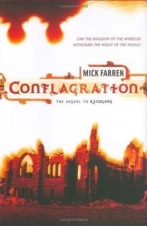Conflagration
A book review.

Conflagration
by Mick Farren
published: 2006.09.01
ISBN: 0765313634
genre: Sci-Fi
reviewed:2022.05.09
When I was a teenager Mick Farren rose to be my favorite author. His vision of how the world works struck a perfect tone, and his semi-lovable losers made for endearing protagonists. I'm surprised that it took me this long to get to this, his final novel, especially considering that I read its predecessor in 2006 - when this one was released.
I found Conflagration to be less of a sequel than a continuation of the previous book. The distinction I'd draw is that a sequel tends to include an evolution in the author as well as the story, whereas this felt very much like more of *exactly* the same.
The story continues in a low-magic, low-fantasy alternate Earth where the magic that exists has a sci-fi twang - at one point the story touches on branes in its explanation of the villain's efforts to bring the reality into contact with others. In this world, the US remains a small nation on the Eastern seaboard of North America, the UK became a Norse country rather than the Anglo-Saxon/Norman society we know and totally love today, Christianity is a minor religion, and a non-Muslim Caliphate has dominated half the world. The last are the hated Mosul. The date appears to be around 1965 - Stalin and Kennedy are leaders at the time of these events, and while technology is lagging behind our world, it is analogous to World War II.
The story features the same four reluctant young heroes that are capable of fighting the unworldly demons and Mothmen that serve the evil Mosul empire. Picking up in the war-torn English-speaking American republics, it features a major battle and the conclusion of the fighting there, then heads across the Pond to take the fight to the Mosul.
I found the middle of this story sagged, and for far too long. The author dwells on an extended romp through the permanent parties of the dissolute British elites, and moves on with too little time left for the actual telling of the story. Farren has had this tendency in the past (e.g. the Citizen Phaid books from thirty years earlier, where the psycho-sex at least served a purpose) but by the time we get to the ruins of Paris and its underground society ruled by a crime syndicate we're already in the final twenty percent of the book and the entire ending feels rushed.
As always, Farren's world-building is airtight and his characters are real people. While two of the main four heroes are somewhat underdeveloped this time out, there's never a moment when anyone feels out of character. There are occasions when people seem to do and say things for the sole purpose of moving the plot, and there are some characters that join the story with a splash only to slide steadily into the background. I couldn't tell if this was on purpose.
One small irritant that popped up a few times in this hardcover: proof-reading errors. There were superfluous close quote characters, typos like the word 'a' appearing before a word starting with a vowel, and in one case the wrong word appearing. I've been noticing this sort of thing more and more over the years. I don't know if it's me or a sign that less effort is going into editing published books. Maybe both.
I'd recommend this book for fans of the author or the alternative-reality genre, or for people who've read Kindling, the previous book.